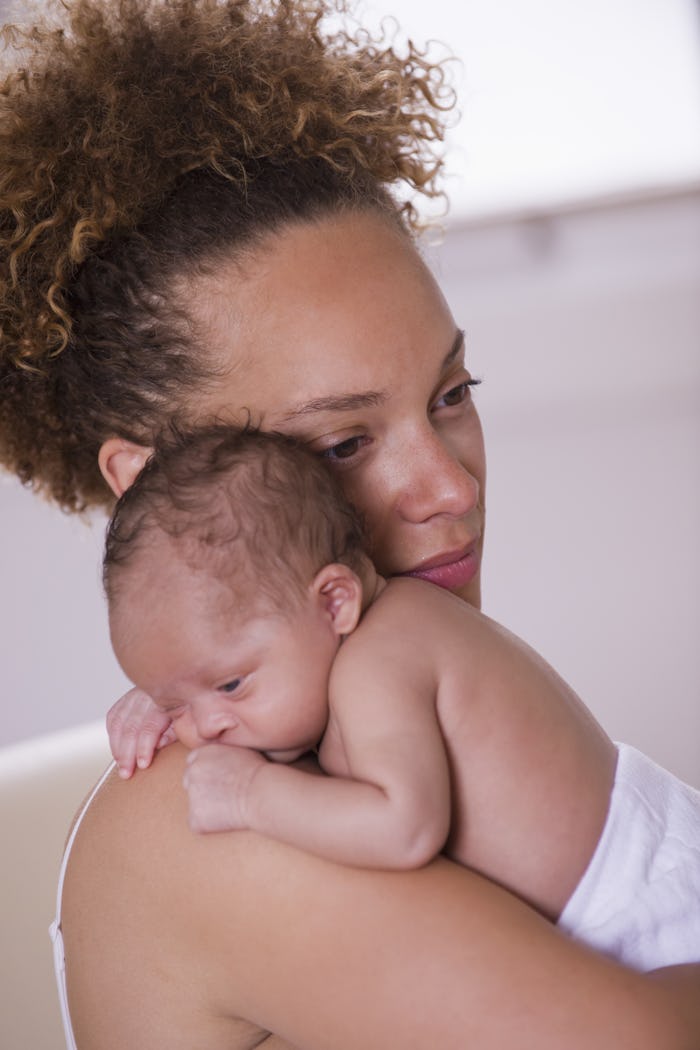Life

9 Myths About Postpartum Depression To Ignore
You might feel isolated; you might feel alienated; you might be paralyzed with anxiety, numbness and self-loathing. I'm talking about postpartum depression, also known as PPD. It's important for people to talk about the disease, as there are too many myths about postpartum depression out there, and these myths make new moms who are suffering feel more alone than ever.
When you give birth to a baby, you're also opening the flood gates to feelings of excitement and joy. But giving birth might also trigger feelings of depression, noted Mayo Clinic. And if you or someone you know is suffering, it's important to reiterate that they're not alone. According to the Centers for Disease Control, PPD symptoms manifest in 11 to 20 percent of women who give birth each year.
It's also important to note that there is no true definition of PPD. In an interview with Romper, Katherine Stone, founder and director of Postpartum Progress, noted that there are many ways that PPD can manifest and that "what PPD looks like for one mom is not what it necessarily looks like for another." It should be noted, however, that PPD is more severe than the postpartum baby blues, a condition that goes away about a week after the baby is born. What else do you need to know about PPD? The following are myths to ignore, so that you can separate fact from fiction.
Myth #1: PPD Is Not A Real Illness
Dr. Samantha Meltzer-Brody, director of the Perinatal Psychiatry Program at the UNC Center for Women’s Mood Disorders told Psych Central that hormonal changes that occur at childbirth are responsible for causing the illness that manifest in PPD symptoms. Estrogen and progesterone surge at childbirth, which is responsible for many mood fluctuations, noted Meltzer-Brody.
Myth #2: Symptoms Develop Immediately After Birth
According to Mayo Clinic, PPD symptoms usually within the first few weeks postpartum. However, these symptoms may begin later, presenting up to six months after birth. There are women struggling with PPD when their kids are toddlers, so, remember Stone's advice that symptoms present differently in every woman. And make sure you seek treatment and realize you're not alone.
Myth #3: If You Think A Loved One Is Suffering From PPD, Wait To See Improvement
According to the organization Postpartum Progress, only 15 percent of women with PPD receive professional treatment, and approximately 850,000 women are suffer from PPD in silence. One explanation for this phenomenon is that many OB-GYNs do not screen for PPD. So if you suspect that your loved one is affected by PPD, say something immediately. Your words might just help her get the help she needs.
Myth #4: Only Women Who've Suffered From Depression Previously Are At Risk For PPD
Though a genetic predispositions to hormonal imbalances are more of a determinant for PPD, it isn't the only thing. In the aforementioned Psych Central article, Meltzer-Brody said that a history of abuse and trauma also might increase risk for PPD. In other words, you don't have to have suffered from depression earlier in life to be affected by PPD, but as Mayo Clinic noted, certain mental illnesses may increase your risk of PPD.
Myth #5: If You Have PPD, You Know It
Even health practitioners and PPD educators might not know they're suffering from PPD. Why? Because PPD is such a complex illness, and, well, women tend to be really hard on themselves in general. You might not experience all the symptoms of PPD in concert, which might make your diagnosis harder.
Myth #6: Sleep Cures PPD
According to Postpartum Progress, sleep deprivation worsens PPD. And although getting rest can alleviate some symptoms, sleep is not a cure to PPD. It's a cure to tiredness. The Journal of Obstetric, Gynecologic, & Neonatal Nursing published a study that confirms that lack of sleep and PPD are correlated, but that there's more to this illness than not getting enough rest.
Myth #7: All Mothers With PPD Think About Harming Their Children
This myth prevails because whenever the media reports on a mom who hurt or killed her child, there's a mention of PPD. However, according to Psych Central, women with PPD are more likely to self-harm than to harm their kids. In fact, suicidal ideation is one of the more devastating manifestations of this illness.
Myth #8: Mothers With PPD Are Always Crying
Although crying is a sign that's often associated with depression, Women's Health reported that mothers with PPD might seem outwardly OK. Symptoms might manifest in other forms, like loss of appetite, anxiety, trouble concentrating, and inner obsessive and disturbing thoughts, as well as feelings of inadequacy.
Myth #9: Only Birth Parents Suffer From PPD
The Journal of the American Medical Association published a study that indicated some dads suffer a form of PPD. In fact, there is a high correlation of PPD in dads and mothers who are afflicted with the illness. Another study published in Advances in Nursing Science indicated that adoptive parents are susceptible to PPD. Looking at rates of PPD in these two populations suggests that there's more research that needs to be done in order to effectively diagnose and treat PPD.